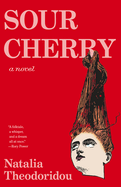
Natalia Theodoridou's debut novel, Sour Cherry, is a lyrical and hallucinatory feminist reimagining of classic fairy tales, most notably "Bluebeard." When Agnes arrives at the castle to serve as wetnurse for the lord's son, she is still grieving the loss of her own child. Soon, the little lord becomes her surrogate son, the boy she commits to raising no matter the darkness she intuits, sees, and even smells coursing through him. As the young lord grows, marries, and leaves to find his place in the world, the world itself withers at his touch. And soon the patterns of destruction that follow him become more a choice than an inheritance, a spiral of violence that leaves a ghostly chorus in its wake.
Theodoridou's brilliant choice to interweave a first-person narrator's dreamlike tale with her experiences of hearing and retelling the story to her own child allows Sour Cherry to comment on the very fairytales it perpetuates. Scattered throughout the novel are reflections on what it means to hear stories, spread them, and be part of them yourself. This awareness of the power of storytelling makes complicity a complicated web in Sour Cherry. Certainly, the little lord is the villain, but "his violence has always been the violence of the world." And that world is shaped by stories, "Stories about young men who were beasts waiting to be turned back into men.... The women in her stories died often, and badly, and beautifully." This is the true cycle of destruction and creation and re-creation. What stories do we choose to tell? Theodoridou asks readers. And how do we choose to tell them? --Alice Martin, freelance writer and editor

